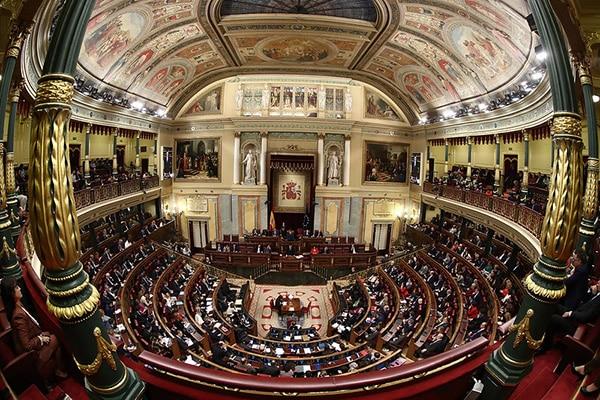Spain’s parliament has officially approved an arms embargo on Israel, marking a significant shift in the country’s foreign policy stance amidst ongoing tensions in the Middle East. The decision, reported by Al Jazeera, signals Madrid’s response to recent developments and aligns with broader calls within Europe for increased accountability in the region. This move comes as international debates intensify over military support and humanitarian concerns related to the Israeli-Palestinian conflict.
Spain’s Parliament Takes Decisive Stance with Formal Approval of Israel Arms Embargo
In a significant development reflecting growing concerns over the escalating conflict in the Middle East, the Spanish Parliament has voted in favor of imposing a formal arms embargo on Israel. This legislative move highlights Spain’s commitment to promoting peace and respecting international humanitarian law amid rising tensions. The embargo prohibits all arms sales, transfers, and related material support to Israeli entities, signaling Madrid’s clear stance against the ongoing violence and civilian casualties. Lawmakers emphasized that this decision aligns with Spain’s broader foreign policy goals of conflict de-escalation and adherence to human rights standards.
The parliamentary approval garnered wide support across multiple political parties, underscoring a rare consensus on the issue. Key points underscored during the debates included:
- Humanitarian considerations: Prioritizing civilian protection in conflict zones.
- Legal obligations: Upholding European Union arms export regulations and international law.
- Diplomatic signaling: Pressuring involved parties towards renewed peace negotiations.
| Vote Breakdown | Number of Votes |
|---|---|
| In Favor | 210 |
| Against | 75 |
| Abstentions | 20 |
Implications for Spanish Foreign Policy and Diplomatic Relations in the Middle East
Spain’s decision to impose an arms embargo on Israel marks a critical juncture in its foreign policy approach toward the Middle East. This move signals a departure from Madrid’s traditionally balanced stance in the region, suggesting a more assertive alignment with European Union efforts to influence peace and security dynamics amidst escalating conflicts. Beyond the immediate impact on military trade, the embargo sends a strong diplomatic message emphasizing Spain’s commitment to international humanitarian law and conflict resolution. Analysts predict that Madrid will leverage this position to enhance its relations with Arab nations and bolster its role as a mediator in regional disputes.
The embargo’s ripple effects will likely reshape Spain’s diplomatic priorities, with several key implications:
- Recalibration of bilateral ties: Strained relations with Israel may lead to cooled political and economic interactions, necessitating new channels for dialogue.
- Strengthened partnerships with Gulf States: Enhanced cooperation with countries like Saudi Arabia and the UAE could open avenues for economic and security collaboration.
- EU cohesion and leadership: Spain positions itself as a leading voice within the EU on Middle East policies, potentially influencing collective strategies toward peace and stability.
| Aspect | Potential Outcome | Strategic Focus |
|---|---|---|
| Diplomatic Relations | Temporary friction with Israel | Conflict mediation |
| Defense Cooperation | Suspended arms trade | Legal compliance |
| Regional Influence | Improved ties with Gulf States | Economic diversification |
| EU Policy Role | Greater leadership in EU | Collective regional strategy |
Recommendations for Monitoring Enforcement and Assessing Impact on Regional Stability
Establishing a robust monitoring framework is crucial for ensuring Spain’s arms embargo on Israel effectively contributes to regional stability. Government agencies should coordinate with independent observers, think tanks, and regional partners to track compliance rigorously. This collaborative approach will help detect any illicit arms transfers swiftly, as well as assess shifts in military capabilities within the region. Transparency reports published quarterly will promote public accountability and reinforce international confidence in Spain’s commitment to peace.
Beyond enforcement, it is equally important to measure the embargo’s wider political and security impact. Stakeholders should consider:
- Developing indicators that capture changes in diplomatic relations among Middle Eastern countries affected by the embargo.
- Assessing humanitarian outcomes linked to reduced arms flow, including civilian safety and displacement trends.
- Engaging with regional conflict resolution bodies to ascertain if reduced arms supplies correlate with de-escalation efforts.
| Aspect | Monitoring Method | Impact Metric |
|---|---|---|
| Arms Trafficking | Satellite surveillance & customs reports | Number of intercepted shipments |
| Diplomatic Relations | Foreign ministry communiqués | Frequency of high-level meetings |
| Civilian Safety | NGO field reports | Civilian casualty trends |
The Way Forward
Spain’s parliament has taken a definitive step by formally approving the arms embargo on Israel, reflecting growing concerns over the ongoing conflict and human rights issues in the region. This legislative move underscores Spain’s commitment to aligning its foreign policy with broader international calls for restraint and accountability. As the situation continues to evolve, Spain’s stance may influence other European nations’ policies and contribute to the wider debate on arms trade and conflict resolution in the Middle East.




